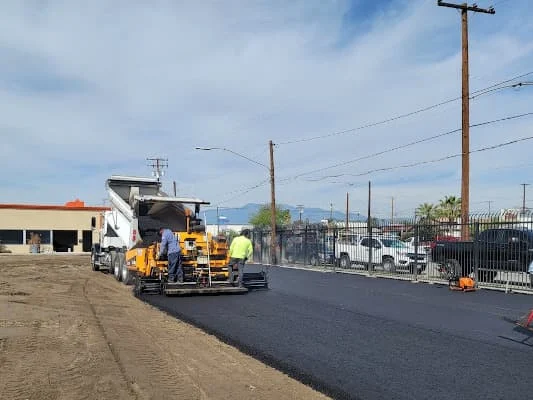When crude oil prices surge, asphalt costs typically follow—often within a matter of weeks. A $10 increase in crude oil prices can translate to a 2-3% rise in asphalt costs, directly impacting your paving project budget. Understanding this connection helps you plan more effectively and make informed decisions about timing your paving or sealcoating project.
The price of crude oil influences far more than fuel costs. It’s a critical factor in construction material pricing, including asphalt. Keep reading to learn how oil prices connect to your paving projects and practical strategies to minimize the potential impact. Then contact our paving company to get your project started!
The Connection Between Crude Oil and Asphalt
Asphalt is one of many byproducts of the crude oil refining process. During refining, crude oil is separated into various products including gasoline, diesel, jet fuel, and asphalt. Because asphalt is a byproduct rather than the primary focus, its base cost is typically lower than refined fuels.
However, crude oil and refined fuel prices play a critical factor in the transportation costs of your project materials. If your materials are coming from a distant location, fuel surcharges can increase material costs considerably—sometimes by 15-20% depending on distance and current fuel prices.
How Does the Price of Oil Affect Asphalt Costs?
Historically, increases in oil prices correlate with higher asphalt costs. Several interconnected factors drive this relationship:
Environmental Regulations and Supply Constraints
As environmental regulations tighten, many oil refineries face increased compliance costs and production restrictions. Regulations such as the EPA’s emissions standards and state-level environmental policies require significant capital investment and operational changes. Some refineries have reduced or eliminated asphalt production due to these pressures, which decreases overall supply and increases prices for consumers. Additionally, the shift toward renewable energy and electric vehicles is reducing long-term demand for some oil products, influencing production priorities. On the positive side, recycled asphalt initiatives are gaining traction, offering environmentally friendly alternatives that can help stabilize costs over time.
Geopolitical Circumstances
Global political tensions and supply chain disruptions significantly impact oil availability and pricing. In recent years, major geopolitical stressors have included political instability in oil-producing nations, international sanctions, supply chain disruptions from the COVID-19 pandemic, and conflicts affecting shipping routes. These circumstances don’t just affect oil and asphalt availability—they also impact the availability of workers and equipment necessary to install materials. When supply tightens, prices spike rapidly across the entire construction industry.
Transportation Costs
One of the most direct impacts of higher oil prices is higher fuel costs. Increased fuel prices mean it becomes significantly more expensive to transport asphalt and other construction materials from refineries and suppliers to your project site. For projects located far from suppliers, transportation can represent 20-30% of total material costs. This is why local sourcing, when available, can help minimize price volatility.
Profit Margin Dynamics
As oil prices rise, refineries face an important decision: which products should they prioritize? Gasoline and diesel have significantly higher profit margins than asphalt. When crude prices spike, refineries have the flexibility to shift production capacity toward higher-margin products. Although asphalt remains widely available, reduced production makes it scarcer, which increases its market price. This dynamic can persist even if crude oil prices stabilize, creating a lag effect in pricing.
Seasonal Trends and Timing Considerations
Asphalt prices tend to be lowest during winter months (November through March) when paving demand decreases and refineries increase production. Spring and summer typically see price increases due to higher demand and reduced refinery output for asphalt during peak construction season. If your project timeline is flexible, scheduling work during off-season periods can result in 10-15% savings on material costs.
How We Can Help
Whether you’re planning paving a new parking lot or trying to preserve it by sealcoating your parking lot, understanding cost factors helps you make smarter decisions.
Here’s our practical advice: When planning your paving or seal coating project, ask for a little wiggle room in your estimate to allow for potential cost fluctuations between the estimate and the project start. We typically recommend building in a 5-10% contingency buffer. The changes in price will impact the initial installation as well as future maintenance projects, so planning ahead pays dividends.
Victory Paving offers reliable services for all of your paving needs and can help you navigate pricing strategies that work within your budget.
Frequently Asked Questions
Q: How often do asphalt prices change?
A: Asphalt prices can shift weekly based on crude oil market movements, though most dramatic changes occur when crude prices move significantly or geopolitical events disrupt supply.
Q: Should I lock in a price quote?
A: Yes. Get quotes in writing with pricing guarantees. Most contractors offer 30-day price locks. For larger projects, negotiate longer guarantee periods.
Q: Is recycled asphalt a good alternative?
A: Recycled asphalt (RAP) can be cost-effective and environmentally friendly, though it performs differently than virgin asphalt. Discuss suitability with your contractor based on your project requirements.
Get Your Free Estimate Today
The cost of asphalt is influenced by many factors that change over time. Understanding these dynamics helps you budget more effectively and time your projects strategically. Contact your San Bernardino paving company by calling 760-367-8047 to receive a free estimate and learn more about how current market conditions may affect your project!
